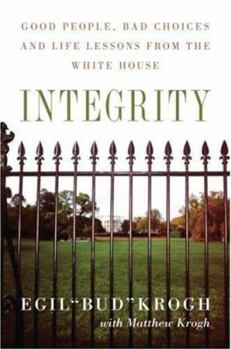Integrity: Good People, Bad Choices, and Life Lessons from the White House
Select Format
Select Condition 
Book Overview
SOON TO BE AN HBO SERIES, "THE WHITE HOUSE PLUMBERS," STARRING WOODY HARRELSON AND JUSTIN THEROUX In 1971, Egil "Bud" Krogh was summoned to a closed-door meeting by John Ehrlichman, his mentor and key confidant of President Richard Nixon, in a secluded office in the Western White House. Krogh thought he was walking into a meeting to discuss the drug control program launched on his most recent trip to South Vietnam. Instead, he was handed...
Format:Hardcover
Language:English
ISBN:1586484672
ISBN13:9781586484675
Release Date:August 2007
Publisher:PublicAffairs
Length:240 Pages
Weight:0.85 lbs.
Dimensions:0.8" x 5.8" x 8.4"
Customer Reviews
5 ratings
Ethics and politics
Published by Thriftbooks.com User , 14 years ago
A serious, thoughtful look at the author's choices and career. Ambitious young people should read this book BEFORE they assume positions of great responsibility.
Integrity: Good People, Bad Choices, and Lessons from the White House
Published by Thriftbooks.com User , 15 years ago
Egil "Bud" Krogh gives a detailed and fascinating look into the Nixon White House and how basically honest, but naive staffers (and one in particular) were misled or failed to question their orders and proceeded to break the law to stop perceived security leaks. Mr. Krogh writes a very compelling explanation of his reasoning for breaking the law, then describes events and his own logic that led him to admit his guilt and start the long road to redemption beyond a prison sentence and disbarment. It made me realize that it could happen to me or anyone who doesn't look carefully into the long term consequences of their decisions, and thus made it easy to identify with his predicament. For people like me who followed the Watergate proceedings with great interest, it is a book that you can't put down.
INTEGRITY: easy to lose, hard to restore
Published by Thriftbooks.com User , 16 years ago
He was a Navy officer serving on the USS Yorktown by the age of 22, in law school at 26, a staff assistant to the counsel to the president at 29, and Undersecretary of Transportation at 33. At 34, he was in jail. How could this happen to a man raised in a highly moral family, with an excellent education, with Christian Middle American values and a strong sense of patriotism? Yet here was Egil "Bud" Krogh at 33, starting a prison sentence for violating the civil rights of Dr. Lewis Fielding, a California psychiatrist. Bud says the principal cause was the collapse of integrity of those members of the White House's Special Investigative Unit (SIU) who conspired, ordered and carried the break-in of the doctor who had been consulted by Dr. Daniel Ellsburg, the "leaker" of the Pentagon Papers" to the New York Times in early 1971. In this short book on integrity and decision-making, Bud Krogh tells his story as an advisor in the White House during the Nixon administration and his role as co-director of the SIU. The reason for the book is quite clearly stated in the Dedication: "To those who deserve better, this book is offered as an apology, an explanation, and a way to keep integrity in the forefront of decision-making". After leaving the Navy in June of 1965, Bud was assisted in his career by John Ehrlichman, a close family friend and father figure to whom he admits he owed complete personal loyalty. Bud was working for Ehrlichman's law firm in Washington State when Ehrlichman was named counsel to the president upon Richard Nixon's election in 1968, and jumped at the chance to move to Washington to assist in the transition, eventually acting as assistant counsel and deputy counsel to the president. In June of 1971, the "Pentagon Papers", revealing that the United States government was deliberately expanding its role in the war while President Johnson was promising not to do so, were leaked to the New York Times by Dr. Daniel Ellsberg. Subsequent attempts by the Nixon Administration to prevent disclosure failed, including a ruling by the Supreme Court halting Administration attempts to prevent publication. Together with a article in the Times revealing the fall- back position of the U.S. in the first SALT talks, these disclosures created a "crisis of major proportions" in the Nixon White House. Bud was selected to co-direct the White House's Special Investigations Unit (better known as the "Plumbers"), and tasked with stopping leaks of top secret information related to the Vietnamese War, the Strategic Arms Limitation Talks and other foreign policy operations. The SIU included such now famous names as G. Gordon Liddy, David Young and E. Howard Hunt, and according to Bud the group felt that it "had been given a critical responsibility by the president, and we were embarking on a quest that held great import for the security of the nation." Bud's SIU decided to go forward with its own investigation. During deliberations, no one in the SIU question
Valuable Lessons and Interesting History
Published by Thriftbooks.com User , 16 years ago
I would primarily like to "second" the previous review (A Needed History Lesson for Our Times). The reviewer says what I would have said, and says it well, particularly in regard to how this valuable book relates to current issues. I would add that I thought I knew the history of the Vietnam era, but I learned so much from this book, and not only concerning the Nixon White House. A very interesting thing to me was the concept of "land reform" and how that issue related to Vietnam, and still is of importance in the world today, when considering how to raise people out of poverty. Bud writes about his time spent in Vietnam, when he was a law student, doing research on land reform issues. He speaks about traveling in the country with reporters who were seeking out members of the Viet Cong to interview. This is just an example of the firsthand and unexpected material that draws a reader in and is so much more involving than one might expect from a book on ethics and integrity. I highly recommend this book, as history, as an explanation of an ethical journey, and, as the previous reviewer said, as a lesson for our time.
A Needed History Lesson For Our Times
Published by Thriftbooks.com User , 16 years ago
At a time when we are governed by an administration that whole-heartedly believes "the ends justify the means", it is crucial to step back and look at history; to see where that motto has failed again and again. Bud Krogh writes an insightful and extremely timely account of his time in the White House under Nixon and his direction of the "Plumbers"--created to seal up real (or perceived) leaks that were threatening our national security. After the 2000 elections, Krogh wrote an open memo, published in the Christian Science Monitor, to Bush's new staff--VP Cheney, Secretary of Treasury Paul O'Neill and Secretary of Defense Donald Rumsfeld--all of whom Krogh had worked with under Nixon in the 1970s. He said as he watched them raise their right hands and swear to uphold the Constitution, it brought back a flood of memories for him when he stood before Nixon and swore to the same oath. "As I pondered what the new Bush staff would encounter, I realized that I might be able to help by writing a memo to them about one of the central ideas that I had not understood as well as I should have when I was on the White House staff...the absolute imperative to maintain one's sense of integrity in the face of enormous pressures to get results at any cost." Krogh explains how a good person, raised in the right way, given all the advantages of a young American male, could end up pleading guilty to depriving another of his civil rights and going to prison. Loyalty to his superiors, including Nixon, overshadowed his oath to uphold the Constitution and that lead him to orchestrate the illegal break-in of Dr. Louis Fielding's Psychiatric office in California for the express purpose of stealing Daniel Ellsberg's personal file to try to discredit him. Ellsberg had leaked the "Pentagon Papers" to the press and Nixon believed this to be a serious national security threat. History has remembered Watergate as the downfall of Nixon's administration, but through Krogh's easy-to-read narrative of the events leading up to Watergate, we find that the break-in and burglary of Dr. Fielding's office was the "seminal event in the chain of events that led to Nixon's resignation". Obviously, Krogh's letter to the Bush staff has gone largely unheeded as we learn almost daily about unwarranted wiretapping; holding prisoners without cause; torture at Abu Graib and Guantanamo Bay; Rove; Libby; the list goes on and on. Who was it that said "those who fail to learn from the past are doomed to repeat it."? At the end of his book, Krogh has created a model called the "integrity zone"; steps that each individual in public or private life can take to ascertain whether the path they have chosen is one of integrity or convenience. With three questions: Is it whole and complete? Is it Right? Is it good? one can quickly figure out if they're standing on solid ground or standing at the edge of a slippery slope. After the events of 9/11, if the Bush administration had stopped to ask tho
Integrity: Good People, Bad Choices, and Life Lessons from the White House Mentions in Our Blog

Book-to-Screen Bounty!
Published by Ashly Moore Sheldon • March 16, 2023
If you love seeing your favorite books come to life onscreen, you're in luck this season! With the ever-growing demand for entertainment content, it seems that there are more literary adaptations than ever before. Here is a list of the book-to-screen bounty you can enjoy this spring.




